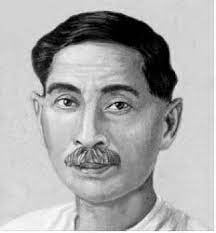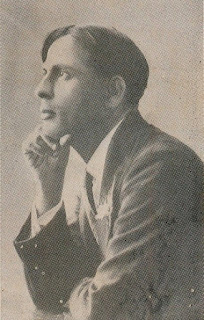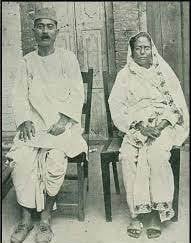( Munshi Prem Chand )
( Firaq Gorakhpuri )
( Munshi Prem Chand and his wife )
FIRAQ GORAKHPURI AND MUNSHI PREM CHAND ..
“ Literature and fine arts inculcate an intense internal and spiritual violence, which enables us to live up to the challenges thrown up by the external world that revels in brutality,”
(Prof Shamim Hanafi, a well-known critic and admirer of the poetry of Firaq Gorakhpuri..)
Writers from Kayasth community of UP , Bihar and Bengal have contributed enough towards development of Hindi , Urdu and English literature . I mean people like Raghupati Sahai ‘Firaq’ Gorakhpuri, Munshi Prem Chand , Mahadevi Verma ,Bhagwati Charan Verma , Dharamvir Bharati ,Nirad C. Chowdhry ,Girija Kumar Mathur , Ram Kumar Verma , Saumitra Saxsena , Dr Harivansh Rai ‘Bachchan’ and many more . However, today need to say something about two writers from the Kayasth community who remained the shining stars on the literary horizon of the country . I mean Firaq Gorakhpuri and Munshi Prem Chand; freedom fighters and great friends as well .
About his chance meeting, around 1912, with Munshi Prem Chand , Firaq writes this :-
“I had reached BA class clearing all examinations. I had come to my home town, Gorakhpur, from Allahabad during summer vacations. One evening I had gone on a walk to the premises of a huge building of a bank at Gorakhpur. There I met a friend, Mahabir Prasad Poddar (later, one of the proprietors of the famous Gita Press), who had another gentleman with him. Apparently, he looked a very ordinary person, wearing a dhoti reaching down to a little below his knees, a Kurta that was much shorter than common kurtas, ordinary shoes on his feet. I started talking to Poddar about new books. His companion also joined the discussion and the subject turned to Prem Chand. Poddar asked me, ‘Do you want to meet Prem Chand?’ It seemed to me as if he was asking if I wanted to acquire the entire wealth of the world. I could not think of my good fortune to be able to see Prem Chand with my own eyes. Showing utter disbelief for his words I asked him, ‘Meeting Prem Chand? How, where and when?’ Both of them started laughing and Poddar told me that the gentleman with him was none other than Prem Chand. I felt as if my breath was going to stop. In fact, along with extreme happiness, I felt a little bit heart-broken. Because Prem Chand appeared to be a person with very ordinary looks whereas I had assumed that such a great litterateur could not be that ordinary-looking, Yet, I was very happy to see Prem Chand.”
Firaq further writes this :-
“In a way I was also made a litterateur by Prem Chand. My first writing was got published in Zamaana by Prem Chand. When I was a political prisoner in jail it was Prem Chand who got some of my stories published in well-known periodicals. I had written a critique of his novel, Gosha-e-Aafiyat (Prem Ashram in Hindi) in jail itself after which he wrote to me: “I felt a spiritual upheaval after reading your critique. You understood my novel better than me.”
Munshi Prem Chand came to Hindi from Urdu while Firaq did the reverse . He started with Hindi and then shifted to Urdu. Munshi Prem Chand had introduced Firaq to Hindi. That was the time when Munshi Prem Chand served as teacher in a school in Gorakhpur and lived close to Firaq’s ancestral house . In fact in 1919, Munshi Prem Chand had introduced Raghupati Sahai ( who later came to be known as Firaq Gorakhpuri ) to Dwarika Prasad Diwedi who edited the popular magazine Swadesh . On Munshi Prem Chand’s recommendations , Firaq was appointed as assistant editor of this magazine on a salary of Rs20/= per month. In this magazine , Firaq published his Hindi translation of Byron’s Don Juan. For this magazine , Firaq wrote Hindi short stories , poems , Dohas , humour based write ups , memoirs , travelogues , features and literary criticisms . Impressed by Firaq’s command and style in Hindi writing , the owners of the Swadesh appointed him as the editor of the magazine . Later , Firaq shifted to Urdu .
‘Firaq’ has written one of the most moving obituaries of Prem Chand . I quote :-
“While reading a book by Prem Chand one feels as if mother India has lifted us in her arms. We hear murmurs of our hearts in Prem Chand’s voice. We get in the magical writings of Prem Chand the life of India, the temper of India, its agonies and ecstasies, its fate, its pious dignity (Suhag) in a manner that is difficult to find elsewhere. This is the reason why among the contemporary writers of Hindi and Urdu Prem Chand has achieved popularity not only in India but international popularity as well.”
Defying the British, It was on February 8, October 1921, when Mahatma Gandhi raised a strong pitch for freedom as he spoke at Bale Miyan ka Maidan in Bahrampur Mohalla, Gorakhpur in the presence of 1.5 lakh people that included Munshi Premchand and Firaq Gorakhpuri . Many people don’t know that both Firaq and Munshi prem Chand resigned from their government jobs after they heard this speech of Mahatama Gandhi. At that time , Prem chand was unwell with two children and a pregnant wife dependent on his salary . Firaq was taken to prison and lodged there for 8 months by the British officials .
Munshi Prem Chand’s style of writing, combination of words, simplicity and flow of language have been remarkable. The emotions of downtrodden people, the strict Raj system and the torn society are the subjects of his short stories and novels . His stories were loved as they touched the real Rural India and the real problems being faced by the underprivileged class. He was one of the few writers who talked about the plight the women living in rural areas and the problems they faced . Munshi Prem Chand could only present the emotions and struggles of Ghisu and Madhav in Kafan and depict of pathetic condition of Indian rural life through the struggles of Hori in Godaan. Munshi Prem Chand also wrote poems. And Munshi Prem Chand wrote this :-
“I am a Cottier. The day I don't write anything, I've got no right to eat too that day."
About Firaq’s contribution Josh Malihabadi writes this :-
“I have to state with considerable regret that India is yet to recognise Firaq’s greatness. ...Anybody who refuses to acknowledge that the great personality of Firaq is the Tilak ( Tika ) on India’s forehead, the honour and dignity of the Urdu language, and the ornament of the Urdu poetry is nothing but a sheer oaf.”
About himself , Firaq wrote this :-
“Aane waali naslein tum par fakhr karengi hum- asro
Jab bhi unko dhyaan aayega tum-ne firaq ko dekha hai."
( Avtar Mota )
 CHINAR SHADE by Autarmota is licensed under a Creative Commons Attribution-Noncommercial-No Derivative Works 2.5 India License.
CHINAR SHADE by Autarmota is licensed under a Creative Commons Attribution-Noncommercial-No Derivative Works 2.5 India License.
Based on a work at http:\\autarmota.blogspot.com\.




No comments:
Post a Comment
Note: Only a member of this blog may post a comment.